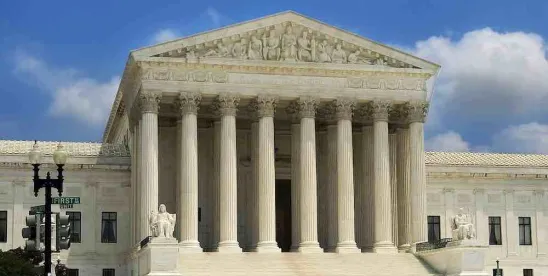Another Three-for Thursday at the Supreme Court, with none of the decisions a landmark but each of utmost relevance to legal specialists and technicians in the fields of bankruptcy, estate taxation, and Indian affairs.
Truck Insurance Exchange v. Kaiser Gypsum Co., Inc. involves the primary insurer for companies that made and sold asbestos-containing products (“Truck”). Two of those companies filed for Chapter 11 bankruptcy. A resulting plan of reorganization created an Asbestos Personal Injury Trust under 11 U. S. C. §524(g), a provision that allows Chapter 11 debtors with substantial asbestos-related liability to fund a trust and channel all present and future asbestos-related claims into it. The insurer has a contractual obligation to defend asbestos personal injury claims and to indemnify the debtors for up to $500,000 per claim. The debtors were required to pay a $5,000 deductible per claim and cooperate in the defense. Truck sought to oppose the reorganization pursuant to §1109(b) of the Bankruptcy Code, which permits any “party in interest” to “raise” and “be heard on any issue” in a Chapter 11 bankruptcy.
Truck claimed that the reorganization plan exposed it to millions of dollars of fraudulent claims and impermissibly altered its rights under its insurance policies. Affirming a District Court ruling, the U.S. Court of Appeals for the Fourth Circuit held that Truck was not a “party in interest” under §1109(b) because the plan was “insurance neutral.” In an essentially unanimous opinion written by Justice Sotomayor (Justice Alito took no part), the Supreme Court reversed, holding that an insurer with financial responsibility for bankruptcy claims is a “party in interest” under §1109(b) that “may raise and may appear and be heard on any issue” in a Chapter 11 case. The Court noted that Section 1109 is “capacious” in its text. Hence, an insurer such as Truck, which has financial responsibility in a bankruptcy claim, is a “party in interest” because it may be directly and adversely affected by the reorganization plan as to its financial interest in the assets of the plan or represent parties that have such interests.
Another unanimous decision, this time with all the Justices participating, is Connelly v. United States. This is just the sort of technical case that Justice Thomas savors—a dry, technical matter largely unconnected with headline public issues. Michael and Thomas Connelly, the sole shareholders of a small business, entered into an agreement intended to keep the company in the family if one of the brothers died. The agreement entitled the survivor to purchase the shares of the deceased, or else, if he declined, the company would be required to do so. To make sure that the company would have enough money to redeem the shares if the survivor declined, the brothers obtained $3.5 million insurance policies. Upon Michael’s death, Thomas did, in fact, decline. At an agreed value of $3 million, the company paid that amount to Michael’s estate. As executor, Thomas filed a federal tax return, reporting the value of Michael’s shares at $3 million. However, an outside auditor had determined that the value of the company was $3.86 million, an amount that excluded the $3 million of insurance proceeds used to redeem Michael’s shares on the theory that the value of these shares was offset by the redemption obligation. That offset was rejected by the IRS, which therefore raised the valuation of the company to $6.86 million and, based on the percentage of ownership, set the value of Michael’s shares at $5.3 million. The IRS thus claimed that the estate owed approximately $890,000 in taxes.
Affirming two lower court decisions, the unanimous Supreme Court held that a corporation’s contractual obligation to redeem shares is not necessarily a liability that reduces a corporation’s value for purposes of the federal estate tax. When calculating the tax, the decedent’s shares in a closely held corporation must reflect the corporation’s fair-market value. Moreover—which I suggest is logical—life insurance proceeds are an asset that increases the corporation’s fair market value. Rejecting the executor’s claim, the Court held that a fair-market-value redemption has no effect on any shareholder’s economic interest and that no hypothetical buyer purchasing Michael’s shares would have treated the corporation’s obligation to redeem those shares at fair market value as a factor that reduced their value. Indeed, such a buyer would treat those proceeds as a net asset, not as a liability. The opinion concludes with the suggestion that if future parties are looking for different outcomes, they should structure their agreements accordingly.
If a dispute involves the rights or interests of an Indian tribe or Native Americans more generally, the odds are pretty good that Justice Gorsuch will be in the majority of Supreme Court Justices upholding them. Such is the case with Becerra v. San Carlos Apache Tribe, in which the Chief Justice, writing for himself and Justices Sotomayor, Kagan, Gorsuch, and Jackson, held that the Indian Self-Determination and Education Assistance Act (ISDA), 25 U. S. C. §5301 et seq., requires the Indian Health Service (IHS) to pay the contract support costs that a tribe incurs when it collects and spends program income to further the functions, services, activities, and programs transferred to it from the IHS in a self-determination contract. In a battle between two conflicting textual readings, the Court’s majority held that the respondent tribes were entitled to federal reimbursement because the spending was necessary for the operation of the programs that they assumed from the IHS. Justice Kavanaugh’s dissent, joined by Justices Thomas, Alito, and Barrett, argues that ISDA does not require the IHS to pay contract support costs to support tribal programs funded by third-party payments.
To paraphrase Justice Kagan in words uttered in another context, “We’re all textualists now.” I’d add that “we don’t necessarily read text the same way.”
The Court still has almost half of its pending cases left to decide. Buckle up as the term moves towards its conclusion.




 />i
/>i
